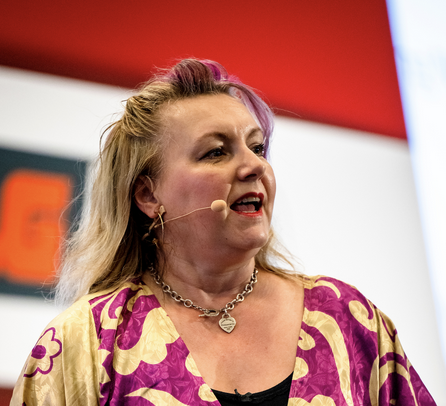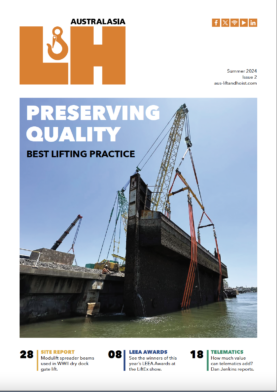)
Getting the alphas and the Zs into lifting
Ali Moore is a relationship therapist at BeMoore, she talked to Maria Hadlow about the very real challenges of attracting the next generations – Generation Z and Generation Alpha – into the lifting industry.
Ali Moore is a psychotherapist who works as a relationship therapist specialising in the science of relationships. That doesn’t just mean couples, but any interactions: families, corporate teams and leadership. She is also very interested in how relationships develop and runs a foundation for young women about building self-esteem and healthy relationships and how our relationship with ourself builds over time
Ali began her career in the corporate world working for Amazon when they first came to the UK and had just one fulfilment centre she worked in HR and always had a interest in training so trained to be a coach, then subsequently trained in psychotherapy.
Ali’s training and work allows her to see the changing characters of progressive generations from the Baby Boomers who are now 60+; Generation X 45 – 59; Millennials who are (terrifyingly) 30 – 44; Generation Z 12 – 29 and, our youngest generation, Generation Alpha who are 11 years or younger. Each successive generation has its aspirations, strengths and weaknesses and by tapping into these – employers can more successively cultivate the workforce of today, tomorrow and into the future.
One of the most affecting influences over the past decade was the Covid pandemic, everyone was affected, not least children and young adults who are now entering the workplace.
“We shouldn’t underplay the effect that Covid had on young people,” says Ali, “And while we all went online and children are more tech-savvy that they have ever been in the past, it is a mistake to think that this was not difficult for them.
“They went from being in a very social environment to being isolated and their contact being solely through screens. Now, while people may believe that young people are always on their screens – that they connect that way – the complete isolation was very disruptive. Viewing the world only through the screen and being constantly confronted with your own self-image had negative impact on many youngsters.
“In the slightly older age group, university students were sitting in a room away from home without the expected social support of their peers or of their family.
“And among the Covid babies, denied playgroups and Mums and Babies groups, mothers reported that their babies didn’t smile at anyone but them – and that’s because everyone else was wearing a mask and the children didn’t relate to other people’s facial expressions.”
“It was frightening enough for adults,” says Ali. “But after lockdown, the reported deaths, and all the measures in place to protect ourselves, children were told to go back to school – a school, which may have thousands of pupils .
“How do children make that adjustment when they have been all about protecting themselves? All about staying distant. They have lost some of the social skills, the body language, all of the good stuff we pick up naturally from each other.
“I realise I am painting a bleak picture and it’s not the same for everyone, but I do believe that for a number of years we need to be mindful of the impact Covid has.
“In the foundation we have seen high levels of anxiety, falling self-esteem and self-confidence. There are problems interacting with peer groups – because it’s different when you interact online to being in a physical group – and difficulty maintaining friendships.
“There are still lots of things that we don’t even know about that are going to come out of the woodwork. As employers we all need to be mindful about noticing some of these things as they occur.”
There is a tendency among older generations to say. “Man-up” – or a similar phrase – when dealing with the sensitivities of a younger people, but Ali says its important to understand that their formative experiences may not have been similar to yours.
“These days there are not the opportunities for young people to get real work experience,” she says. “Many of us had Saturday or part-time jobs when we were at school. I had a job working in a chemist, I worked on Saturdays and in the holidays – most children now will not have had that opportunity and when they go to their first job it may be the first time, they’ve had a work experience.
So having missed out on normal social interactions through Covid and most never having a part-time job. The world of work is – a whole different world for them,” says Ali.
All the facets of a work environment: the rules, the consequences; how to build repour and how to interact are all new. Bearing in mind too that if someone is doing an apprenticeship you might be taking them on at 16 or 17 years old, which is really young.
“It is important to be really clear, have a be simple induction so they know who to go to if they have questions. Having buddies and check-in points can also help adjust successfully to the world of work. I
“It sounds like what you’d want to do for anyone, when they start at your workplace, but when it’s someone’s first experience of work it can be overwhelming. Some young adults do have a lot of self-efficacy – they will lean in and say – ‘how can I help?’ but others won’t be as confident or feel able to push themselves forward. You’ve got to be aware of that and allow them to integrate and help them understand the environment, what are the boundaries, what is the structure, what are the rules? And who can I talk to?
Apprenticeships are widely acknowledged as an excellent training route allowing a young person to learn while they earn and giving the sort of hands-on experience that can never be replicated in the classroom alone.
Ali agrees that apprenticeships work well for those who choose a more practical, hands-on pathway but many young people are finding themselves funnelled into an apprenticeship because they have ‘failed’ academically.
Ali says,” Because, academically a young person has not been able to reach the standard that would allow them to go on and do A-levels and a university degree they may be pushed into an apprenticeship – so it feels like a failure. The apprenticeship represents a route they may not know much about and may not be drawn to – so they [and their employer] are starting on a back-foot.”
So, as an employer you could be faced with a young person who has never been in a working environment, doesn’t know much about the role they are taking on, doesn’t know if its something they want to do and doesn’t really want to be there, because they wanted to do something else. They may be feeling disappointed and not good enough so every set back will be another blow.
“This is the time when you really have to get to know your young people,“ advises Ali.
“Some companies do a really good job of this and take a few months to talk about life in the working world with their new employees – about communication, team building, soft skills, accountability and responsibility and what their employees’ goals are. “
A few weeks spent at the early stage could ensure the apprentice has a fulfilling route into the world of work.
Young people have a lot of useful skills to bring into employment, they may just be different to skills of the Boomers and Gen X. They may also have different expectations from their working environment. So how can you attract young people to your industry and company?
“Children are naturally curious, they like problem solving, robotics and anything futuristic. If you can harness their imagination then you can harness their enthusiasm. They want to be interested, inspired and to make an impact – after all that’s what we all want.
“If you can, get them to Imagine what it would be like working in that world – get them to do hands-on problems solving. Show them the excitement and the purpose so they understand the why. Then you are creating an appealing career.
“Technology is huge,” says Ali, “Children are born tech-savvy and know how to swipe a screen from a young age and the brain is evolving: creating a shorter attention span, so you need to interest them to keep their focus. The next generation is attracted by technology, solutions-based work, flexibility and diversity in their role. Help them see the possibilities of what they can achieve to keep them engaged.”
Women in industry
When asked about why it is difficult to attract girls to the STEM subjects and a career in industry. Ali Moore controversially says, “They are just not interested.”
“Be that how they a brought up or the environment they are in – these are not jobs they are interested in. Direct feedback from young women says they don’t see these jobs as for them – it’s factual.
“In order to get more young women into the industry, you have to get more young women into the industry – you need to create a movement. They don’t want to be the only young women on a course full of young men. Perhaps if we ran courses that were solely for young women, we would we get more interest.
“Girls are picking options at pivotal development ages, and for many young women friendships and peer groups are important – ‘All my friend are doing this – I don’t want to be the only one.’”
“So how do we make it less intimidating? I don’t want to put all young women in a box – some will have huge resilience and confidence and won’t care that they will be in the minority – but that isn’t everyone. At that age there is a lot of safety in togetherness, in what your friends are wearing, listening to, their opinion etc.
“Selecting STEM subjects and a career in industry has to feel like it’s for them. Wheeling out female role models to demonstrate diversity may even make it worse as it implies that a woman doing a technical job is unusual – when they just want to be normal.”









